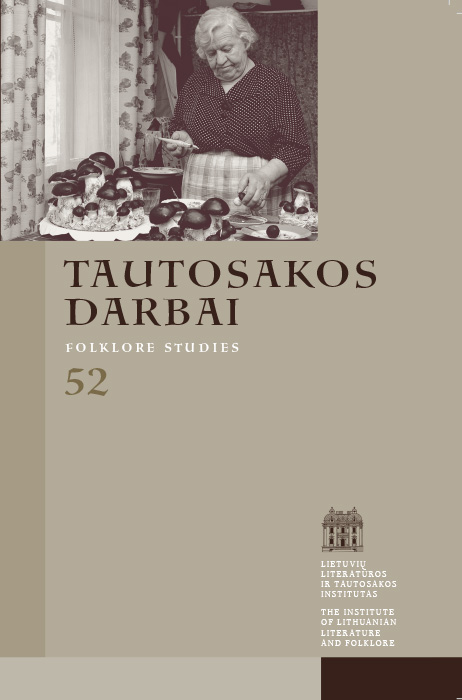Traditional Musician in the Nowadays Lithuanian Village or Small Town’s Community
Abstract
Folk musicians belonging to the older generations and playing various instruments have been subject to rather exhaustive research in Lithuania since the end of the 20th century until the present. Various aspects of their music making, including the repertoire, changes in the style of their performance, the musician’s image, role and place in the community have also received considerable attention. However, traditional musicians belonging to the younger generation and their music making have scarcely fallen into the focus of study so far. The modern ethnomusicologists researching and appreciating the traditional music making devote considerable attention to the perspectives of the musicians and their surrounding community. Such a two-fold research, taking into consideration both the musician’s and the community’s approach, enables evaluating the general situation of the traditional instrumental and vocal instrumental music making in the community. By comparing the expressed views of the Lithuanian traditional musicians belonging to the younger generation and the perspectives of the surrounding community, the author of the article attempts establishing the kind of musicians that is in demand in the Lithuanian villages and small towns of the end of the 20th – beginning of the 21st century. The author of the article combines qualitative research (the in-depth partly structured multiple interviews) with documentary and biographical methods.
According to the analysis, not only the roles of the traditional musician and the community, but also their mutual relationship has suffered considerable shifts in the nowadays culture. The functions of the musician as bearer, promoter and reviver of the tradition have become much more prominent. By adapting to the altering wedding traditions, the musician does not decline performing not only the functions of the former main participants of the wedding, but also those of the presenter of the whole event. The individual musical faculties and skills do not bear such importance in the eyes of the community members, as they do to the musicians themselves. The community mostly appreciates the universal capacities of the traditional musician, also ascribing importance to his tight relationship with the local traditions. The latter quality is important to the musicians as well; it includes the inherent feeling of the local music and its appreciation (from instrumentation and familiarity with the traditional local repertoire, to the live music making, and to the knowledge of customs and rituals, which are particularly important during various festive events and weddings). Since the tradition of the ritual communal singing is increasingly in decline, the capacity of the musicians to sing well and to start the appropriate songs as means of preserving and supporting this tradition is especially meaningful. It is safe to maintain that traditional musicians are currently people sensitively reacting to the changes in the traditional musical culture and actively participating in the local musical life until nowadays. To the contrary, rejection of the musical innovations renders the traditional musician incapable of competing with the requirements of the modern musical market. In such case, the musician may even have to stop playing and surrender his place to the professional or semi-professional wedding musicians with virtually no knowledge of the local musical customs, or even to the sound recordings.
Downloads
Most read articles in this journal
- Agata Adamaitytė, Kristina Rutkovska, Lithuanian Folklore Published in Wisła: Bibliographic Inventory (1888–1899) , Tautosakos darbai: Vol. 55 (2018)
- Jurgita Senulienė, Historical Narrative of American Lithuanian Identity , Tautosakos darbai: Vol. 61 (2021)
- Aurelija Gritėnienė, The Mental Image of the Mountain Ash (Sorbus L.) in the Dictionary of the Lithuanian Language , Tautosakos darbai: Vol. 52 (2016)
- Sigita Kraniauskienė, In Search of Memory and Identity of the Lithuanian Borderline Communities , Tautosakos darbai: Vol. 47 (2014)
- Salomėja Bandoriūtė, The Traditional Anecdote: What Did Lithuanians Find Funny in the End of the 19th–the Middle of the 20th Century? , Tautosakos darbai: Vol. 49 (2015)
- Marius Smetona, Agnė Lisauskaitė, Greta Mierkytė, Ieva Vaitkutė, Conception of Manor in the Lithuanian Worldview , Tautosakos darbai: Vol. 57 (2019)
- Giedrius Kuprevičius, On Guard of the Lithuanian Identity , Tautosakos darbai: Vol. 47 (2014)
- Irena Seliukaitė, Libertas Klimka. Lietuviškų tradicijų skrynelė, Vilnius: Didakta, 2013 , Tautosakos darbai: Vol. 47 (2014)
- Олег Смоляк, Павло Смоляк, Оксана Довгань, The Image of Water in the Traditional Rituals and Folksongs of the Western Podolia , Tautosakos darbai: Vol. 58 (2019)
- Milda Norkaitienė, Ethnological Background of the Sheep’ Names , Tautosakos darbai: Vol. 54 (2017)




